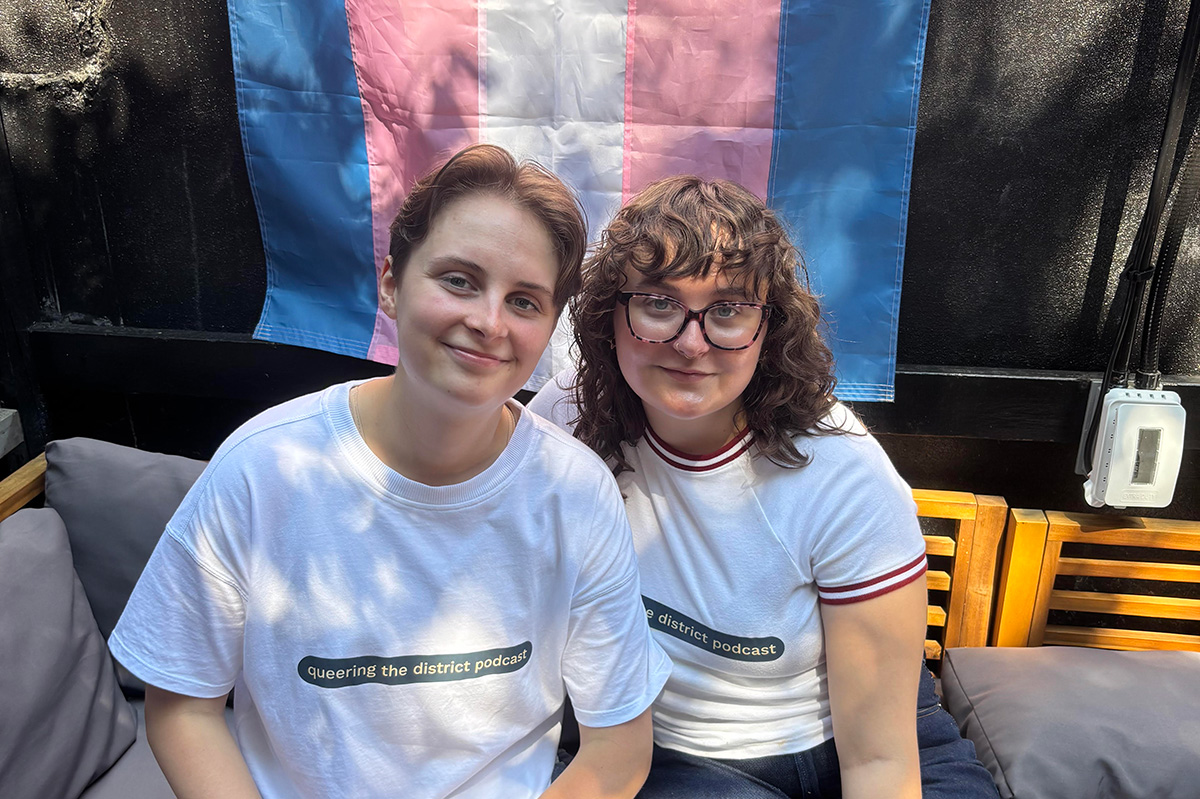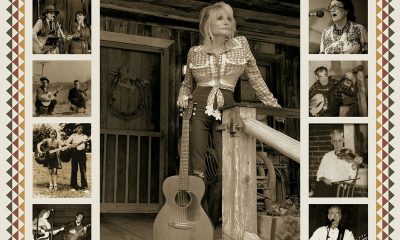a&e features
Alexander the great
Years & Years frontman on his influences, philosophies and being an out pop singer

Olly Alexander, lead singer of British electronica-pop band Years & Years, sounds like the guy you meet at the coffee shop who talks to you in a soft-spoken tone about the book he’s currently reading. He gives no indication that Years & Years has won an mtvU award for “Artist to Watch” this year, has millions of views for their music videos on YouTube, and that this is their second-sold out show in D.C.
Years & Years, consisting of Alexander, bassist Mikey Goldsworthy and synth player Emre Türkmen, has been making waves on the music charts with their single “King” reaching number one on the U.K. Singles Chart and their new single “Shine” has already shot to number two. Alexander, 25, met Goldsworthy and Türkmen after they had decided to form a band and became the group’s lead singer and keyboardist. Now, the group will be playing a sold-out show at 9:30 Club on Sept. 19.
Calling from New York City, where Years & Years is preparing for a show before their 9:30 Club appearance, Alexander talked to the Blade about his sexuality, boyfriend and his re-found love for New Age gem shops.
Washington Blade: Lately you’ve been speaking up a lot about how you feel that gay singers should use more same-sex pronouns in their songs. Why do you think that’s so important?
Olly Alexander: Well I think popular culture influences culture. It influences everybody and we should be showcasing different kinds of relationships in our mainstream culture. Not just male and female but male and male and female and female. I think we live in a world where we all know that there are different dynamics. And I think pop music should reflect that and I think why not? Also, I just think it felt empowering personally so I think it could be empowering for other people to do it too.
Blade: Do you make a real effort to try and include same-sex pronouns in your own music?
Alexander: Yeah! I don’t want to dictate how anyone writes a song, that’s not my job at all. But I think I wanted to include it in my own lyrics so I did it in a few songs and it felt good to do that.
Blade: You’re also very open about your relationship with Neil Amin-Smith from the band Clean Bandit. Do you ever worry about people’s reactions to you as an out gay couple?
Alexander: I don’t worry in terms of like a homophobic level. That was never a consideration. I feel like that would be living in fear. I’m a big believer you should never live in fear or shame. Largely the response has been really wonderful and lovely. I think it’s been really kind of humbling for me to meet people who are so welcoming. They’re really grateful that we’ve been open about our relationship. The difficult thing is, you can imagine having a relationship that’s somewhat in the media can have its own pressure regardless if you’re a gay couple or not.
Blade: Were you ever concerned about being out and the lead singer of a band? Did you ever consider not publicly addressing it?
Alexander: I didn’t really consider that. I mean to be honest with all the music and when we made the music video for one of our earlier songs “Real,” you know the song was quite obviously about a boy and we made the video that I thought reflected kind of non-heteronormative sexuality. That was really obvious to other gay people that I was gay that I was singing about a man. So it was so much apart of the music that I would never, ever hide that. It would seem ridiculous to even try and do that.
Blade: This is the second sold-out show that Years & Years has had in D.C. But you haven’t received too much radio play in this area. Do you think that your popularity came from the Internet? What do you think about the Internet’s impact on music artists these days?
Alexander: I think definitely it came from building a following online. The Internet I think has changed the way we listen to music. It’s changed the way we all live and consume music. I think maybe radio and commercial radio used to really determine the acts that kids gravitated towards. Now I think if you can build a fan base online you can go to these places and still have people show up to your shows. It’s kind of amazing.
Blade: When Years & Years first started your sound wasn’t quite as electronic/pop as it is now. What brought about that change?
Alexander: It was just a natural evolution really. When we started we were just using instruments that we had. That was mainly guitars. We gradually began using more synthesizers and making more beats and producing on a laptop. Our tastes were changing and over a few years we discovered what music we enjoyed making and it was kind of electronic sounds. It kind of just came together gradually.
Blade: You’ve also done some acting in television and movies. You even co-wrote the screenplay for the film “The Dish and the Spoon.” Any plans for more acting or screenwriting?
Alexander: I haven’t gotten any plans at the moment. But you never know I might do it again some day in the future.
Blade: A lot of the roles you have done have been straight roles. What made you choose those particular roles?
Alexander: I just really took what I was offered. I just wanted to make some money.
Blade: You’ve mentioned before that your first job was at a New Age gem shop. Are you into New Age things like astrology or tarot cards?
Alexander: Wow, I love that you know that! I’m not so much at the moment. I used to be really into all of that kind of shit. But I went into a New Age-y kind of shop recently and bought a couple crystals. And I felt good about that.
Blade: Have you ever heard a lyric and wished that you had written it?
Alexander: Oh yeah all the time. There’s a really good Jeff Buckley lyric from a song called “Gunshot Glitter.” And the lyric is “I wanna be your lover/Lipstick my name across your mirror.” I really love a Joni Mitchell lyric in “Case of You” I remember that time you told me you said ‘love is touching souls’/surely you touched mine/Cause part of you pours out of me/in these lines from time to time” I really like that one too.
Blade: What do you want people to take away from your music? What do you think makes audiences connect to your music the way that they do?
Alexander: If they take away anything that’s kind of a win for me or make people feel a certain way. But I suppose to move someone and make them feel good or sad or make them think about something. That’s a bonus for me. We have always believe the song has to be like a good song. That’s a certain kind of science we’ve been obsessed with creating, making good hooks and structures. But apart from that we’ve really tried to do everything as authentically as possible. We write all of our own music and write every lyric and every melody. We’ve always been open and honest about that and I hope that connects with people too.

a&e features
From Prohibition to Pride: Queering the District podcast reveals local LGBTQ history
The new podcast explores the hidden history and enduring impact of queer spaces in Washington, D.C.

On June 25, as Pride month inched toward its end, three queer creators launched an ambitious project to honor the spaces that built D.C.’s LGBTQ community—and connect them to today’s queer life. The first episode of their podcast, Queering the District, hit streaming platforms that day, aiming to spotlight what host and co-creator Abby Stuckrath calls “third places”: bars, clubs, and gathering spots that have served as hubs for queer life across the city.
Each episode of the 10-part series delves into a different piece of D.C.’s queer past—from landmark clubs to untold personal stories—told through the voices of drag legends, activists, DJs, historians, and patrons who lived it. The show also threads together personal experiences from today’s community, bringing the listener on an auditory journey from Prohibition-era speakeasies to contemporary nights out at places like As You Are or Saints & Sinners.
Abby Stuckrath, alongside her sibling Ellie Stuckrath, and producer Mads Reagan, make up the podcast’s creative team. A recent journalism graduate of American University, Abby told the Blade that her passion for queer storytelling began during college—and that D.C. itself played a defining role in shaping her queer identity.
“I went to American University. I graduated last year and studied journalism. When I was in school, I always wanted to focus on queer stories – especially in D.C., because I’m from Denver, Colorado, I’ve never lived in a place like this before. D.C. has always just kind of been a place I call home when it comes to my queer identity.”
But breaking into the media to tell those stories wasn’t easy. Stuckrath quickly learned that editorial support—and funding—for queer-focused projects is limited. So she decided to do it her own way.
“I kind of found out that if you want to tell stories, you kind of have to do it on your own– especially when it comes to queer stories. There’s not a lot of people begging for us to talk about queer people and to pay you for it. So I was like, ‘Okay, let’s just do it on my own.’”
The idea for the podcast first took root in conversations with Ellie, Abby’s sibling and biggest supporter. Ellie had also moved to D.C. to find more space to explore and express their queer and gender identities. Together, the two began shaping a vision that would combine storytelling, sound design, and grassroots community input.
“I was like, ‘I don’t know what exactly I want to do yet, but I want it to be queer, and I want it to be about D.C., and it’s going to be called Queering the District, and we’re going to find out what that means.’ And Ellie is my biggest supporter, and my best friend. And they were like, ‘Hell yeah. Like, let’s do this.’ And so we decided to just do it together.”
The name stuck—and so did the mission. The team began researching queer D.C. history and found a city overflowing with stories that had rarely been documented, especially in mainstream archives.
“We started looking up the history of queer culture in D.C., and it kind of just clicked from there,” Stuckrath said. “I did not know anything about how rich our history is in the city until one Google search, and then I just kept learning more and more. I was kind of pissed because I studied gender studies in school in D.C. and didn’t learn shit about this.”
Season one focuses on the role of third places—non-work, non-home spaces where queer people could gather, exist fully, and build community.
“Third places have always been the epicenter of queer life… places outside of just your own personal home, because sometimes that isn’t a safe place. And of course, the work most commonly in the past and still today, isn’t a safe place for queer people to be full of themselves. So like, bars were the first place for queer people to really thrive and meet each other.”
To make the show participatory, Queering the District includes a twist: a voicemail line where anyone can call in and share a memory or question. The team calls the phone “Fifi”—a nod to the kind of retro guestbooks often used at weddings, but reimagined for queer nightlife and history.
“We wanted to find a way for people to share their stories with us anonymously… so even though we start in Prohibition, we wanted to connect it to now—like, those people who were singing jazz to each other in a white queer bar are connected to you singing karaoke on a Sunday night at your favorite gay bar. We’re all interconnected by this third place of queer bars in D.C.”
Those connections are emotional as well as historical. While building the series, one realization hit Stuckrath particularly hard: the immense loss of queer spaces in D.C., especially in neighborhoods that have since been heavily redeveloped.
“Every time I go to a Nats game, I think about, well, this just replaced five gay bars that used to be here. It used to be the home of Ziegfeld’s… Tracks, which was almost 2,000 square feet, with a volleyball court in the back, a fire pit, and iconic light show. I just didn’t know that we had that, and it made me sad for the queer elders that are in our city now who walk the streets and don’t see all those places they used to call home.”
That sense of loss—alongside the joy and resilience of queer community—is what the show aims to capture. As the podcast continues, Abby hopes it serves as both a celebration and an educational tool, especially for young LGBTQ people arriving in D.C. without realizing the queer foundations they’re walking on.
“D.C. is a unique city, and specifically young queer people who are hoping to move to the city—to know that you’ve got to know your history to be here. I hope this serves as an easier way for you to consume and learn about queer history, because queer history defines how we move in life.”
And for all the voices still left out, Abby is clear: this podcast is an open door, not a final word.
“This is a perfectly imperfect podcast. We should just be a starting point. We shouldn’t be the ending point.”
New episodes of Queering the District drop every Wednesday on all major platforms.
a&e features
Doug Spearman takes his chance
‘Noah’s Arc: The Movie’ debuted on Paramount+ last month

There’s no question that when Patrik-Ian Polk’s series “Noah’s Arc” premiered on Logo 20 years ago, it was a groundbreaking creation. The story of a group of Black gay men and their wonderful friendship. The titular arc was that of the cute main character, Noah (Darryl Stephens), and his close-knit circle of friends, including Chance played by gay actor Doug Spearman. This compelling and loving fraternity may, in fact, be what brought viewers back repeatedly, including a 2008 movie, “Noah’s Arc: Jumping the Broom,” as well as the 2020 “Noah’s Arc” short, and now, a new full-length feature “Noah’s Arc: The Movie,” debuting on Paramount+ on June 20. In the movie, filled with equal measures of laughs and tears, Chance, who has faced a devastating loss, finds his dependable friends there, ready to support and comfort him at a moment’s notice. I had the pleasure of speaking with Spearman the morning of the streaming premiere of “Noah’s Arc: The Movie.”
WASHINGTON BLADE: Doug, since the early 2000s, when the “Noah’s Arc” series premiered on Logo, you have been playing the character of Chance, including in the latest installment, “Noah’s Arc: The Movie.” What was it about Chance that appealed to you as an actor?
SPEARMAN: When Patrik (-Ian Polk) called me to ask me to play him (Chance), I was at JFK airport in the baggage claim, waiting for a suitcase. He explained what the part was. The thing that stuck out to me was the fact that Chance was in a long-term relationship with another Black man. And, they had a child; they had a 4-year-old daughter named Kenya. I had never seen two Black gay men raise a child on TV before. I thought it was the most revolutionary thing I’d ever seen. I immediately thought I’ve got to do this because that was something nobody had seen. I thought it was incredibly important to take the part.
BLADE: “Noah’s Arc: The Movie” was, once again, written and directed by Patrik-Ian Polk, who you just mentioned, is the creator of the entire franchise. What’s the secret to your long-standing working relationship?
SPEARMAN: [Laughs] the whole team, all of us, are like a band of brothers. We fight like brothers, we come together like brothers, we hash things out, we talk, because we’re all very different from our characters. I think the challenge of playing these guys and then uplifting these men, playing a part, especially something written by Patrik, is like solving a math equation. There’s always a challenge that’s enjoyable for me as an actor: to try to find out what it is that Patrik wants, and then how do I do it.
BLADE: I think you do a very good job of it.
SPEARMAN: Thank you very much
BLADE: In the years between “Jumping the Broom” and the new full-length movie, many changes have occurred, and the story addresses some of them, including gay widowhood, which is something that the aging community is now confronting, as well as mental health issues. Please say a few words about how you approached those subjects in the new movie.
SPEARMAN: I had a lot of loss in my life, right before we started shooting. Two months before we started shooting the first series, my mother died. I was going through the grief process through that whole first season. Since then, I’ve lost a lot of people in my life. In fact, when we started shooting the second season, the second week we were shooting, my ex died of a heart attack. I was having to fold that into what I was doing with my life on the set and off the set. You’ve got to show up and you’ve got to do your work. The first two seasons of “Noah’s Arc” are always tinged with the memory of grief. So, when I had to deal with the death that Chance faces (in the new movie), which is a significant death in his life, it wasn’t that hard to reach back, especially the scene in the graveyard. It was something that I unfortunately could pull from personal experience.
BLADE: Shifting gears, the movie features delightful cast surprises, including Jasmine Guy and TS Madison. Did you have a chance to interact with either or both when they were on set?
SPEARMAN: No, I didn’t have any scenes with Jasmine, and I missed her. I wish I had gotten to see her because I actually got to direct Jasmine for a CBS promo shoot for “Queen,” back in the early ‘90s. I had a huge crush on her when she was on “A Different World.” So, I really would have liked to reconnect. But TS and I got to see each other every day because I was in all her scenes. It was extraordinary being around somebody like that. That is one outspoken woman!
BLADE: Even though Beyoncé never makes an appearance in the movie, there’s a lot of talk about her. Would you say you are a Beyoncé fan?
SPEARMAN: Yes! I’m breathing! Yes, I’m a Beyoncé fan. I actually got the chance to meet her. I knew her mom. Her mom was extraordinary to me. She is in the second movie I directed. She also gave us a wedding gown to use in the very first scene of the movie. That family is extraordinarily important to me. Not only just to be a fan, but to be somebody who’s gotten to know them and work with them and see how hard they work. I don’t think anybody works as hard as Tina or Beyoncé.
BLADE: There was a recent news item about gay actor Benito Skinner of the Amazon Prime series “Overcompensating” being told not to bother auditioning for straight roles. As an out actor yourself, how important do you think it is for queer characters to be portrayed by queer actors, and vice versa?
SPEARMAN: Being queer is a multifaceted identity. There’s no one kind of queer person. I think finding the best actor that’s your first circle of casting. I think one of the joys about being an actor is that you get to play different parts. I play straight guys all the time. Dads and husbands and things like that. I think a lot of people are told not to do it. In fact, I wouldn’t be Chance if the actor who was originally cast as Chance hadn’t been pulled out of the series by his agents because they didn’t want him to play a gay character.
BLADE: That’s amazing! Thank you for sharing that. Without giving away too much, the ending of the movie is a little ambiguous, even ending with a question mark. If there was a “Noah’s Arc: The Movie” sequel, would you come back for that?
SPEARMAN: Yeah! A lot of it would depend on what Chance’s journey is going to be like. Patrik and I have conversations like that all the time. He’s very interested and supportive of input. I hope I would be, as we all would be, part of the creative growth with these characters. They live in Patrik’s head, and he writes them, but we’re the ones who have to flesh them out. It’s a conversation, it’s always a conversation.
BLADE: You are currently performing in Molière’s “The Imaginary Invalid” as part of the New Orleans Shakespeare Festival at Tulane. What has this experience been like for you?
SPEARMAN: It’s extraordinary! I started on stage when I was seven. There’s nothing like working with a live audience and having that immediacy. I’m working with an extraordinarily talented cast in a really great play, and I have some of the best scene partners I could ever want.
BLADE: Are there any upcoming film or TV projects you’d like to mention?
SPEARMAN: I’m still a writer, and I’m still a director, and I’ve still got scripts that I would like to make. I have a little something that’s a cross between “Treme” and “Bridgerton” that I want to do. I’m always trying to figure out what the next thing is.
a&e features
Visit Cambridge, a ‘beautiful secret’ on Maryland’s Eastern Shore
New organization promotes town’s welcoming vibe, LGBTQ inclusion

CAMBRIDGE, Md. — Driving through this scenic, historic town on Maryland’s Eastern Shore, you’ll be charmed by streets lined with unique shops, restaurants, and beautifully restored Victorian homes. You’ll also be struck by the number of LGBTQ Pride flags flying throughout the town.
The flags are a reassuring signal that everyone is welcome here, despite the town’s location in ruby red Dorchester County, which voted for Donald Trump over Kamala Harris by a lopsided margin. But don’t let that deter you from visiting. A new organization, Proudly Cambridge, is holding its debut Pride event this weekend, touting the town’s welcoming, inclusive culture.
“We stumbled on a beautiful secret and we wanted to help get the word out,” said James Lumalcuri of the effort to create Proudly Cambridge.
The organization celebrates diversity, enhances public spaces, and seeks to uplift all that Cambridge has to share, according to its mission statement, under the tagline “You Belong Here.”
The group has so far held informal movie nights and a picnic and garden party; the launch party is June 28 at the Cambridge Yacht Club, which will feature a Pride celebration and tea dance. The event’s 75 tickets sold out quickly and proceeds benefit DoCo Pride.
“Tickets went faster than we imagined and we’re bummed we can’t welcome everyone who wanted to come,” Lumalcuri said, adding that organizers plan to make “Cheers on the Choptank” an annual event with added capacity next year.
One of the group’s first projects was to distribute free Pride flags to anyone who requested one and the result is a visually striking display of a large number of flags flying all over town. Up next: Proudly Cambridge plans to roll out a program offering affirming businesses rainbow crab stickers to show their inclusiveness and LGBTQ support. The group also wants to engage with potential visitors and homebuyers.
“We want to spread the word outside of Cambridge — in D.C. and Baltimore — who don’t know about Cambridge,” Lumalcuri said. “We want them to come and know we are a safe haven. You can exist here and feel comfortable and supported by neighbors in a way that we didn’t anticipate when we moved here.”

Lumalcuri, 53, a federal government employee, and his husband, Lou Cardenas, 62, a Realtor, purchased a Victorian house in Cambridge in 2021 and embarked on an extensive renovation. The couple also owns a home in Adams Morgan in D.C.
“We saw the opportunity here and wanted to share it with others,” Cardenas said. “There’s lots of housing inventory in the $300-400,000 range … we’re not here to gentrify people out of town because a lot of these homes are just empty and need to be fixed up and we’re happy to be a part of that.”
Lumalcuri was talking with friends one Sunday last year at the gazebo (affectionately known as the “gayzebo” by locals) at the Yacht Club and the idea for Proudly Cambridge was born. The founding board members are Lumalcuri, Corey van Vlymen, Brian Orjuela, Lauren Mross, and Caleb Holland. The group is currently working toward forming a 501(c)3.
“We need visibility and support for those who need it,” Mross said. “We started making lists of what we wanted to do and the five of us ran with it. We started meeting weekly and solidified what we wanted to do.”
Mross, 50, a brand strategist and web designer, moved to Cambridge from Atlanta with her wife three years ago. They knew they wanted to be near the water and farther north and began researching their options when they discovered Cambridge.
“I had not heard of Cambridge but the location seemed perfect,” she said. “I pointed on a map and said this is where we’re going to move.”
The couple packed up, bought a camper trailer and parked it in different campsites but kept coming back to Cambridge.
“I didn’t know how right it was until we moved here,” she said. “It’s the most welcoming place … there’s an energy vortex here – how did so many cool, progressive people end up in one place?”
Corey van Vlymen and his husband live in D.C. and were looking for a second home. They considered Lost River, W.Va., but decided they preferred to be on the water.
“We looked at a map on both sides of the bay and came to Cambridge on a Saturday and bought a house that day,” said van Vlymen, 39, a senior scientist at Booz Allen Hamilton. They’ve owned in Cambridge for two years.
They were drawn to Cambridge due to its location on the water, the affordable housing inventory, and its proximity to D.C.; it’s about an hour and 20 minutes away.
Now, through the work of Proudly Cambridge, they hope to highlight the town’s many attributes to residents and visitors alike.
“Something we all agree on is there’s a perception problem for Cambridge and a lack of awareness,” van Vlymen said. “If you tell someone you’re going to Cambridge, chances are they think, ‘England or Massachusetts?’”
He cited the affordability and the opportunity to save older, historic homes as a big draw for buyers.
“It’s all about celebrating all the things that make Cambridge great,” Mross added. “Our monthly social events are joyful and celebratory.” A recent game night drew about 70 people.
She noted that the goal is not to gentrify the town and push longtime residents out, but to uplift all the people who are already there while welcoming new visitors and future residents.
They also noted that Proudly Cambridge does not seek to supplant existing Pride-focused organizations. Dorchester County Pride organizes countywide Pride events and Delmarva Pride was held in nearby Easton two weeks ago.
“We celebrate all diversity but are gay powered and gay led,” Mross noted.
To learn more about Proudly Cambridge, visit the group on Facebook and Instagram.
What to see and do
Cambridge, located 13 miles up the Choptank River from the Chesapeake Bay, has a population of roughly 15,000. It was settled in 1684 and named for the English university town in 1686. It is home to the Harriet Tubman Museum, mural, and monument. Its proximity to the Blackwater National Wildlife Refuge makes it a popular stop for birders, drawn to more than 27,000 acres of marshland dubbed “the Everglades of the north.”
The refuge is walkable, bikeable, and driveable, making it an accessible attraction for all. There are kayaking and biking tours through Blackwater Adventures (blackwateradventuresmd.com).
Back in town, take a stroll along the water and through historic downtown and admire the architecture. Take in the striking Harriet Tubman mural (424 Race St.). Shop in the many local boutiques, and don’t miss the gay-owned Shorelife Home and Gifts (421 Race St.), filled with stylish coastal décor items.
Stop for breakfast or lunch at Black Water Bakery (429 Race St.), which offers a full compliment of coffee drinks along with a build-your-own mimosa bar and a full menu of creative cocktails.
The Cambridge Yacht Club (1 Mill St.) is always bustling but you need to be a member to get in. Snapper’s on the water is temporarily closed for renovations. RaR Brewing (rarbrewing.com) is popular for craft beers served in an 80-year-old former pool hall and bowling alley. The menu offers burgers, wings, and other bar fare.
For dinner or wine, don’t miss the fantastic Vintage 414 (414 Race St.), which offers lunch, dinner, wine tasting events, specialty foods, and a large selection of wines. The homemade cheddar crackers, inventive flatbreads, and creative desserts (citrus olive oil cake, carrot cake trifle) were a hit on a recent visit.
Also nearby is Ava’s (305 High St.), a regional chain offering outstanding Italian dishes, pizzas, and more.
For something off the beaten path, visit Emily’s Produce (22143 Church Creek Rd.) for its nursery, produce, and prepared meals.
“Ten minutes into the sticks there’s a place called Emily’s Produce, where you can pay $5 and walk through a field and pick sunflowers, blueberries, you can feed the goats … and they have great food,” van Vlymen said.
As for accommodations, there’s the Hyatt Regency Chesapeake Bay (100 Heron Blvd. at Route 50), a resort complex with golf course, spa, and marina. Otherwise, check out Airbnb and VRBO for short-term rentals closer to downtown.
Its proximity to D.C. and Baltimore makes Cambridge an ideal weekend getaway. The large LGBTQ population is welcoming and they are happy to talk up their town and show you around.
“There’s a closeness among the neighbors that I wasn’t feeling in D.C.,” Lumalcuri said. “We look after each other.”
-

 Federal Government2 days ago
Federal Government2 days agoTreasury Department has a gay secretary but LGBTQ staff are under siege
-

 Virginia3 days ago
Virginia3 days agoDefying trends, new LGBTQ center opens in rural Winchester, Va.
-

 District of Columbia2 days ago
District of Columbia2 days agoGay GOP group hosts Ernst, 3 House members — all of whom oppose Equality Act
-

 Opinions4 days ago
Opinions4 days agoUSAID’s demise: America’s global betrayal of trust with LGBTQ people













